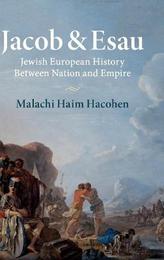
|
Jacob & Esau: Jewish European History Between Nation and Empire
Hardback
Main Details
| Title |
Jacob & Esau: Jewish European History Between Nation and Empire
|
| Authors and Contributors |
By (author) Malachi Haim Hacohen
|
| Physical Properties |
| Format:Hardback | | Pages:752 | | Dimensions(mm): Height 235,Width 158 |
|
| Category/Genre | Judaism |
|---|
| ISBN/Barcode |
9781316510377
|
| Classifications | Dewey:940.04924 |
|---|
| Audience | | Professional & Vocational | |
|---|
| Illustrations |
Worked examples or Exercises; 10 Halftones, black and white
|
|
Publishing Details |
| Publisher |
Cambridge University Press
|
| Imprint |
Cambridge University Press
|
| Publication Date |
10 January 2019 |
| Publication Country |
United Kingdom
|
Description
Jacob and Esau is a profound new account of two millennia of Jewish European history that, for the first time, integrates the cosmopolitan narrative of the Jewish diaspora with that of traditional Jews and Jewish culture. Malachi Haim Hacohen uses the biblical story of the rival twins, Jacob and Esau, and its subsequent retelling by Christians and Jews throughout the ages as a lens through which to illuminate changing Jewish-Christian relations and the opening and closing of opportunities for Jewish life in Europe. Jacob and Esau tells a new history of a people accustomed for over two-and-a-half millennia to forming relationships, real and imagined, with successive empires but eagerly adapting, in modernity, to the nation-state, and experimenting with both assimilation and Jewish nationalism. In rewriting this history via Jacob and Esau, the book charts two divergent but intersecting Jewish histories that together represent the plurality of Jewish European cultures.
Author Biography
Malachi Haim Hacohen is Professor and Bass Fellow at Duke University, North Carolina. He serves as the Director of the Religions and Public Life Initiative at the Kenan Institute for Ethics. His book Karl Popper - The Formative Years, 1902-1945 (Cambridge, 2000) won the Herbert Baxter Adams Prize of the American Historical Association and Austria's Victor Adler State Prize.
Reviews'Malachi Haim Hacohen explains the interactions between nations and empires through the prism of Jewish experience, seen in the round and in wonderful detail. This is one of the greatest books in social studies published in the postwar years, an absolute masterpiece by a scholar of astonishing power.' John A. Hall, author of Ernest Gellner: An Intellectual Biography 'Monumental in scope and in moral intensity, Hacohen's historically grounded meditation on European Jewish history is like no other book. Organized around the biblical tale of Isaac's quarreling sons named in the title, Jacob and Esau demonstrates the importance of the rabbinical Judaism so often neglected or patronized.' David A. Hollinger, author of Science, Jews, and Secular Culture 'This historiographical sweep and conceptual boldness, this monumental study will doubtlessly command the critical attention of a wide readership. The resulting debate will surely secure Professor Hacohen's position at the forefront of contemporary historians.' Paul Mendes-Flohr, author of German Jews: A Dual Identity 'Staggering in its range and ambition, this ground breaking (and deeply personal) attempt to write a 'Jewish European history' reveals Hacohen to be one of the most thought-provoking and original thinkers working in the field today.' Abigail Green, author of Moses Montefiore: Jewish Hero, Imperial Liberator '... is a dense, yet extremely erudite, take on Jewish European history ... To the best of my knowledge, this is the first book to include the perspective of rabbis and Christian theologians as part of that history. It is easily this year's most important book on Jewish history.' Aaron Howard, Jewish Herald-Voice '... this book is a laudatory attempt at rethinking the Jewish part of European history, and deserves major attention, also from Habsburg historians.' Steven Beller, Austrian History Yearbook 'Jacob & Esau is a brilliant, bewildering medley of myth, history, literary criticism, and prophecy.' Allan Arkush, Jewish Review of Books 'Jacob & Esau explores the history of Jews' relationship to modern Central European politics, the limits of the nation-state, and the possibilities offered to minority groups living under imperial regimes. It challenges our understanding of modern Jewish history as a liberal project and highlights the political and spiritual opportunities that at one time were provided through federated forms of collective organization ... [Hacohen's] passion and creativity will certainly inspire students of European and Jewish history. His work should be read as a provocative and deeply personal meditation ... whose questions promise to inspire future research.' Eliyahu Stern, H-Judaic
|